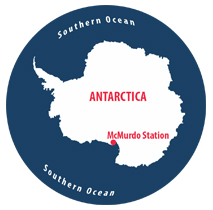|
In order to design a meaningful research project, scientists must first have a solid understanding of the subject they wish to study. Dr. Mellish and her team are fortunate because the Weddell seal population on McMurdo Sound has been studied extensively since 1968. Data collected as part of this Montana State University project has resulted in one of the most complete life histories of any wild mammal population in the world!
Learn about the life history of Weddell seals. (3:50)
Video Transcript
Dr. Jay Rotella, Montana State University: “Weddell seals are found only in Antarctica, they’re a true seal ‘phocidae’, so you see they don’t have the external ears like some of the sea lions that people see at zoos and aquariums.
“They’re one of several truly Antarctic seals, they’re only found in this part of the world. They’re one of the better diving marine mammals in the world, they can hold their breath for over forty minutes and dive to about 2,000 feet (600 meters).
“We know them to be a seal that swims back in under the frozen sea ice, and they come up through the tide cracks. Around here against these islands we have places where the ice is attached to the shoreline and then out here the tide goes up and down a few feet (one meter). The seals use that diving ability to get back in here and come out through these tide cracks and use this area. One of their tricks in life is to get in here and have the pups away from predators, so that may be part of why they let us work in and around them. They don’t have predators up here about the ice, so they’re not worried about having anything happen to them. I don’t know that for sure, but it’s kind of an idea that people talk about.
“For the first few weeks of life the babies are wearing this lanugo coat, this fleecy looking coat. They’re not very fat yet when they’re brand new and they’re not waterproof. For a while they’re really, really visible to us up on the surface, and then as they get a little fat from mom’s milk they’ll start to swim and learn some skills in the water. Then they’ll be a little less available to us for our work.
“The next part of their life they sort of disappear from here. The first couple years of life they’re not around very much in the breeding colonies. They’re some evidence that they go out into the pack ice and probably exploiting fish out in those areas, although that’s not that well understood yet.
“Then at some point around three, four, five years old they’ll come back into these colonies and start to give birth and maybe have a pup every two out of three years. Start giving birth between age five and seven, and then have one pup a year maximum.
“Most of these animals live to be about five years old. Most animals that are born don’t make it to adulthood. The first couple years of life they’ve got about a fifty-fifty chance of survival. If they can make it to age three, the survival rates get very high; they’re getting bigger, they’re getting stronger, and probably know their way around and have places they know to find food and shelter. If they make it age three than they can make it to about 15 years old. The oldest seal we’ve ever had was thirty, but probably not very many make it that long, that’s rare. When we see a 20 year old, or a 25 year old, those are pretty old seals. “
While much is known about the life history of Weddell seals, less is understood about the species' physiological needs, including how they thermoregulate. In fact, due to the challenges that come with studying animals that split their time between land and sea, very little is known about the energetic costs of thermoregulation in any marine mammal species.
Physiologist Dr. Allyson Hindle explains the concept of energetics and describes what makes up the 'energy budget' of a Weddell seal. (1:13)
Video Transcript
Dr Allyson Hindle: "One way that I really like to think about animal physiology is considering it in terms of energetics. Think about energetics, energy, as a currency that an animal can gain and spend. You would gain energy by eating fish, but in order to get those fish, in order to earn the energy, they have to spend it. They have to swim, they have to digest the food that they eat, they have to breathe, and they have to stay warm. All of those things cost energy.
"So when we’re talking about energetics, we’re talking about the balance between spending and gaining. An animal that has a positive balance is taking in more energy than its using, and it’s going to grow if they’re a young animal, or its going to have excess energy to reproduce. On the otherhand, an animal that is spending more than its gaining, is going to start losing its body fat and losing its body mass. These animals become skinnier and skinnier, and ultimately bad things happen to them.
"We’re interested in how animals live at this balance, and what happens when conditions change to change that balance".
Thanks to recent advances in technology, tools now exist that allow scientists to study energetics in marine environments. Dr. Jo-Ann Mellish and her team hope to use these tools to establish a baseline for the energetic costs of thermoregulation in Weddell seals. They will use this information to predict polar seals' ability to adapt to changing habitat conditions.
|







